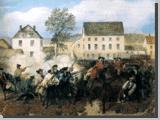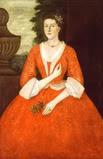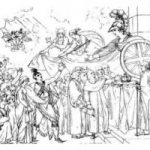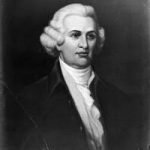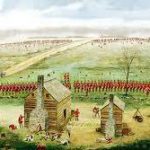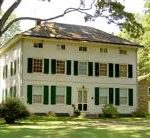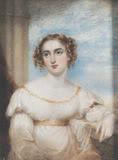British Loyalist in the American Colonies
Image: Shot Heard ‘Round The World
Anne Hulton was a sister of Boston’s commissioner of customs and, like some 15 to 35 percent of the white colonial population, a British Loyalist. Loyalists were American colonists who remained loyal to Great Britain during and after the Revolutionary War. They were often referred to as Tories, Royalists, or King’s Men by the Patriots, those who supported the American cause.
Most of what is known about Anne Hulton comes from the letters she wrote to her friend Elizabeth Lightbody between 1763 and 1776. Of Hulton’s published letters the most frequently studied have been those written during 1767-1776, collected in Letters of a Loyalist Lady (1927). Scholars first noticed Hulton through her brother, Henry Hulton, who was a commissioner of customs (a tax officer) in Boston during the nine years preceding Revolutionary War.
The letters offer a firsthand view of political relations in the prewar period, as well as Loyalist views of the American Revolution. They also chronicle the everyday life of an upper-class eighteenth-century woman in colonial America, and they portray a friendship between two women who worry about one another’s health, share news of friends and relations, and maintain their correspondence even in wartime.
Hulton’s work offers the modern reader insight into various facets of life in the colonies: social relations, gossip and fashions; agricultural practices, observations on native plants and animals and domestic economy; diseases and cures; and the family ties and responsibilities of single women in the eighteenth century.
Anne Hulton’s birth date is unknown. E. Alfred Jones has noted that her father was John Hulton of Chester and that she never married. She did, however, become an important member of her brother’s growing family, which consisted of Henry, his wife, Elizabeth, and the four sons whose births were noted in Hulton’s letters.
In September 1767, Anne announced two exciting events: Henry Hulton’s appointment to a post in the colonies and the birth of his first child. Henry and his wife wanted Anne to accompany them to their new home, and he had promised to take good care of her there. She also laid out her intentions to do something productive in the colonies. She planned to establish herself as either a merchant or planter.
Henry Hulton left England ahead of his family, arriving in Boston in November 1767. Anne Hulton left for the colonies early in 1768, traveling with Elizabeth and baby Thomas. On her arrival in Massachusetts five weeks later, Hulton got a clearer view of political life there, which presumably deflated her ideas of becoming a tradeswoman.
The first letters she wrote from the colonies were posted from Castle William, a fort in Boston Harbor to which the family had retreated (along with other families of government agents) because of the threat of violence against them.
In this letter to her friend Elizabeth Lightbody back in England, Anne Hulton described the actions of the Minutemen, whom she called the banditti, during the Battle of Lexington and Concord, April 19, 1775:
On the 18th instant at 11 at night, about 800 grenadiers and light infantry were ferried across the bay to Cambridge; from whence they marched to Concord, about 20 miles. The congress had been lately assembled at that place, and it was imagined that the general had intelligence of a magazine being formed there and that they were going to destroy it.
The people in the country (who are all furnished with arms and have what they call minute companies in every town ready to march on any alarm) had a signal, it’s supposed, by a light from one of the steeples in town, upon the troops embarking. The alarm spread through the country so that before daybreak the people in general were in arms and on their march to Concord.
About daybreak a number of the people appeared before the troops near Lexington. They were called to, to disperse, when they fired on the troops and ran off. Upon which the light infantry pursued them and brought down about fifteen of them. The troops went on to Concord and executed the business they were sent on, and on their return found two or three of their people lying in the agonies of death, scalped and their noses and ears cut off and eyes bored out, which exasperated the soldiers exceedingly, a prodigious number of people now occupying the hills, woods, and stone walls along the road.
The light troops drove some parties from the hills, but all the road being enclosed with stone walls served as a cover to the rebels, from whence they fired on the troops still running off whenever they had fired, but still supplied by fresh numbers who came from many parts of the country. In this manner were the troops harassed in their return for seven [or] eight miles. They were almost exhausted and had expended near the whole of their ammunition when, to their great joy, they were relieved by a brigade of troops under the command of Lord Percy with two pieces of artillery.
The troops now combated with fresh ardor and marched in their return with undaunted countenances, receiving sheets of fire all the way for many miles, yet having no visible enemy to combat with, for they never would face them in an open field, but always skulked and fired from behind walls and trees, and out of windows of houses, but this cost them dear for the soldiers entered those dwellings and put all the men to death.
Lord Percy has gained great honor by his conduct through this day of severe service; he was exposed to the hottest of the fire and animated the troops with great coolness and spirit. Several officers are wounded and about 100 soldiers. The killed amount to near so; as to the enemy we can have no exact account, but it is said there was about ten times the number of them engaged and that near 2000 of them have fallen.
The troops returned to Charlestown about sunset after having some of them marched near fifty miles, and being engaged from daybreak in action, without respite or refreshment, and about ten in the evening they were brought back to Boston. The next day the country poured down its thousands, and at this time from the entrance of Boston Neck at Roxbury round by Cambridge to Charlestown is surrounded by at least 20,000 men, who are raising batteries on three or four different hills.
We are now cut off from all communication with the country, and many people must soon perish with famine in this place. Some families have laid in store of provisions against a siege. We are threatened, that whilst the outlines are attacked, with a rising of the inhabitants within, and fire and sword, a dreadful prospect before us, and you know how many and how dear are the objects of our care. The Lord preserve us all and grant us an happy issue out of these troubles.
For several nights past, I have expected to be roused by the firing of cannon. Tomorrow is Sunday, and we may hope for one day of rest. At present a solemn dead silence reigns in the streets, numbers have packed up their effects and quitted the town, but the general has put a stop to any more removing and here remains in town about 9,000 souls (besides the servants of the Crown). These are the greatest security; the general declared that if a gun is fired within the town, the inhabitants shall fall a sacrifice.
Amidst our distress and apprehension, I am rejoiced our British hero was preserved. My Lord Percy had a great many and miraculous escapes in the late action. This amiable young nobleman, with the graces which attracts admiration, possesses the virtues of the heart and all those qualities that form the great soldier – vigilant, active, temperate, humane, great command of temper, fortitude in enduring hardships and fatigue, and intrepidity in dangers. His lordship’s behavior in the day of trial has done honor to the Percys. Indeed, all the officers and soldiers behaved with the greatest bravery, it is said.
Notes:
Minutemen were a small hand-picked elite force which were required to be highly mobile and able to assemble quickly. They were selected from militia muster rolls by their commanding officers. Typically 25 years of age or younger, they were chosen for their enthusiasm, reliability, and physical strength. Usually about one-quarter of the militia served as Minutemen, and were the first armed militia to arrive or await a battle.
Inst was a common abbreviation for instant, meaning the month this was written. The Grenadiers were elite British troops who wore long red coats and tall bearskin hats. A magazine, in this context, was an ammunition warehouse. Hugh Percy was a British brigadier general. The Otter was a British sloop that would engage in battle in the first week of May.
By the end of 1775, having endured months in a besieged city, Anne Hulton sailed for England.
When their cause was defeated, about 20% of the Loyalists left the United States to resettle in other parts of the British Empire, in Britain or elsewhere in British North America, especially New Brunswick.
SOURCES
Minutemen
The Battle of Lexington and Concord: April 19, 1775
